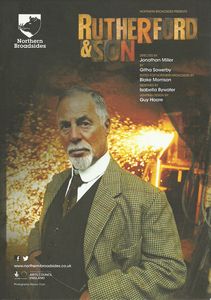RUTHERFORD & SON by
Githa Sowerby
Northern Broadsides
Venue: Watford Palace 2013
Directed by Jonathan Miller
Northern Broadsides
Venue: Watford Palace 2013
Directed by Jonathan Miller

| John Rutherford has built up the business like his father before him and he naturally expects to pass it on to his eldest son. However, his son has other plans. He has something to sell, an invention that will release him from his father's tyranny and a future following in those laborious footsteps. With aspirations to achieve independence, make their own futures and find love, Rutherford's children have choices to make that may jeopardise the business and the family. | |
| Cast |
|
| John Rutherford | Barrie Rutter |
| John Rutherford his son |
Nicholas Shaw |
| Richard Rutherford his son |
Andrew Grose |
| Janet |
Sara Poyzer |
| Ann |
Kate Anthony |
| Mary |
Catherine Kinsella |
| Martin |
Richard Standing |
| Mrs Henderson |
Wendi Peters |
Barry Rutter, Catherine Kinsella, Nicholas Shaw
Reviews
The Times
Githa Sowerby’s powerful family drama, written in 1912, speaks for any family ruined by a father of fixed ideas and unwise power. And Rutherford & Son is ideal for the tough honest vigour of Northern Broadsides, whose founder Barrie Rutter was born to roar and glare as Rutherford senior. It could have been too much had Rutter not cunningly lured Jonathan Miller to return to stage directing, after an absence of five years (his last directing job was Hamlet in Bristol in 2008). Miller gives the production subtlety and restraint.
When it had its premiere a century ago, Sowerby’s play drew comparisons with Ibsen, and insulting amazement from journalists when her youth and gender were revealed. The Daily Mail gasped: “You might suspect her of eating chocolates or talking nonsense in the shade . . . never dream that she could be the author of a play with the grim force of a Pinero or the sureness of a Galsworthy”. Unease, perhaps, at the home truths powerfully uttered by the play’s women and the tyranny and weakness of the men.
Yet this is no feminist tract, but a vigorous portrait of commerce overreaching humanity: an intimate tragedy of the industrial North. Sowerby’s grandfather, like the patriarch in the play, ran a glassworks by the Tyne; tweaking the text to suit Yorkshire and the rest of us, Blake Morrison has made only small dialect changes.
The patriarch gets full rein as he mocks, bullies or cheats his sons — the weedy John (Nicholas Shaw) and Dick the curate (Andrew Grose), and throws his daughter Janet out for loving a working man (“I’ve brought you all up a class, and you’re to stay there!”). Yet, struggling with a failing business and reluctant banks, Rutter is allowed enough weariness and momentary self-doubt to win a surprising amount of sympathy.
The women are superb: Kate Anthony his grumpy sister, jeering at young John’s wife, Mary, for putting bows on her baby’s cap (“Trash fit for a monkey at a fair”), Mary (Catherine Kinsella) meek but steadfast, the passionate, faded Janet played by Sara Poyzer with electric desperation. Wendi Peters has a fabulous cameo as a whining petitioner, unsentimentally illustrating the company’s workforce challenges. But most impressive of all, given understated force by Richard Standing, is Martin: a decent worker betrayed by circumstance and principle into betraying three people in different ways, all disastrous. He completes Sowerby’s remarkable circle of pattern, plot and psychology and his sadness echoes down a century.
* *
* * *
The Daily Telegraph
The Daily Telegraph
Just how bad a man is John Rutherford? Last time I saw Githa Sowerby’s enduring drama of Edwardian family dysfunction, at the Royal Exchange in Manchester eight years ago, he struck me as the very model of a detestable industrial patriarch: ruling his workforce with a rod of iron and demanding unquestioning loyalty and self-sacrifice from his resentful brood. Yet in Jonathan Miller’s compelling new revival for Northern Broadsides, I swear there are moments you’re thinking: this guy isn’t so awful – in fact he’s almost heroic.
Is that because Miller identifies at some level with the figure of inveighed-against authority, and subtly shifts our sympathies? Is it because Barrie Rutter – Broadsides’s bluff, no-nonsense boss – has landed the plum role of the single-minded glass manufacturer and brings to the part an intriguing warmth of personality as well as an air of fixed-eyed determination? Or is it because we now find ourselves trapped in the economic doldrums and Rutherford’s insistence on doing whatever it takes to keep his end up and his business afloat – even if that means stealing an invention from his eldest son – appears more admirable than not?
Whatever the contributing factors, the result is that, 100 years or so after it wowed London, Rutherford & Son is again a must-see, worth-debating event. Amid the period detail of Isabella Bywater’s set and atmospheric murk it summons the ghosts of Northern toil and trouble past; on the road, it will chime with different anxieties. The product of a Gateshead glassmaking family herself, Sowerby didn’t just bear witness to the plight of the working-man – she grasped the imprisoning insecurities of the middle classes.
Miller’s production is beautifully attentive to the play’s richness of ideas and complexity of moods, its molten combination of grit and transparent emotion. In a programme note, he likens it to Chekhov – and there are moments of surprising comedy, especially from Kate Anthony as Rutherford’s dour, bluntly plain-speaking sister. But Ibsen is the more relevant model. Everyone contributes towards shaping Sowerby’s vision – whether it’s Nicholas Shaw as the fragile, needy eldest son, incandescent with resentment, Sara Poyzer as Rutherford’s daughter, filled with proto-feminist fury at her misspent, loveless youth, or Richard Standing as the pathetically grateful foreman Martin. That vision, seen through a glass darkly, is one of inherited damnation.